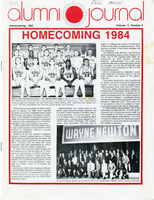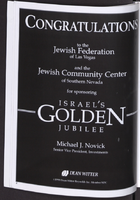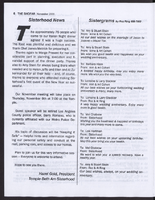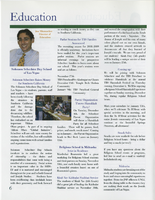Search the Special Collections and Archives Portal
Search Results

UNLV Alumni Journal, Volume 11, Number 5
Date
Archival Collection
Description
Volume 11, number 5 edition of the University of Nevada, Las Vegas "The Alumni Journal."
Mixed Content

Transcript of interview with Brad Friedmutter by David G. Schwartz, September 12, 2016
Date
Archival Collection
Description
Brad Friedmutter is the architect behind a number of Steve Wynn’s prominent casinos in Las Vegas, Nevada and Atlantic City, New Jersey. He obtained his degree in architecture in 1973 from the Cooper Union School of Architecture in lower Manhattan and worked on a number of smaller projects before connecting with Steve Wynn. After meeting the famous Vegas tycoon, Friedmutter built a number of well-known casinos, like the Golden Nugget and the Mirage. In this interview, he discusses the development of his numerous projects, explains his process for starting and completing architectural projects, and the future of urban planning and casino design.
Text

Transcript of interview with Melody Stein by Barbara Tabach, August 16, 2016
Date
Archival Collection
Description
In this interview, Stein lovingly describes various forms and mediums of art, especially rubber stamping, which included starting and managing a related craft publication, National Stampagraphic, as well as working with polymer clay. She talks about her involvement with the local Polymer Clay Guild, of which she is president, and their various projects, including Bottles of Hope and Hearts for Heroes. Stein also discusses her teaching career at the Hebrew Academy and Adelson Educational Campus.
Text

Transcript of interview with Fred Gibson by Maisie Gibson, March 9, 1975
Date
Archival Collection
Description
On March 9, 1975, Maisie Gibson interviewed Fred Gibson (born 1927 in Golden, Colorado) about his life in Nevada. Gibson first talks about his family’s background, their move to Nevada, and his education in early Las Vegas schools. He also mentions his service in the U.S. Army, his college education, and his occupation as an engineer at various companies. Gibson then talks about the various locations at which he has lived, his membership in clubs and charitable organizations, and his memories of the first properties on Fremont Street as well as those of the Helldorado Parade. The interview then covers the topics of mining, the atomic testing, economic and environmental changes, and social changes. The interview concludes with a discussion on the growth and development of Henderson, Nevada.
Text

Transcript of interview with Elbert Edwards by Ronald Johns, 1972
Date
Archival Collection
Description
On an unspecified date in 1972, Ronald Johns interviewed Elbert Edwards (born 1907 in Panaca, Nevada) about his life in Southern Nevada. Edwards first talks about his family’s move to Panaca, Nevada in 1864 and talks briefly about his work in Las Vegas public schools during the Great Depression. The two also discuss the Boulder Dam, Edwards’ involvement in politics, and mining in Nevada. He also talks about the cost to build a home in Las Vegas in 1936, the development of Boulder City, and the way of life in the small town of Panaca. The interview then moves on to the topics of the early territorial boundaries of Nevada and Utah, the atomic testing at the Nevada Test Site, and early water sources in Southern Nevada.
Text





